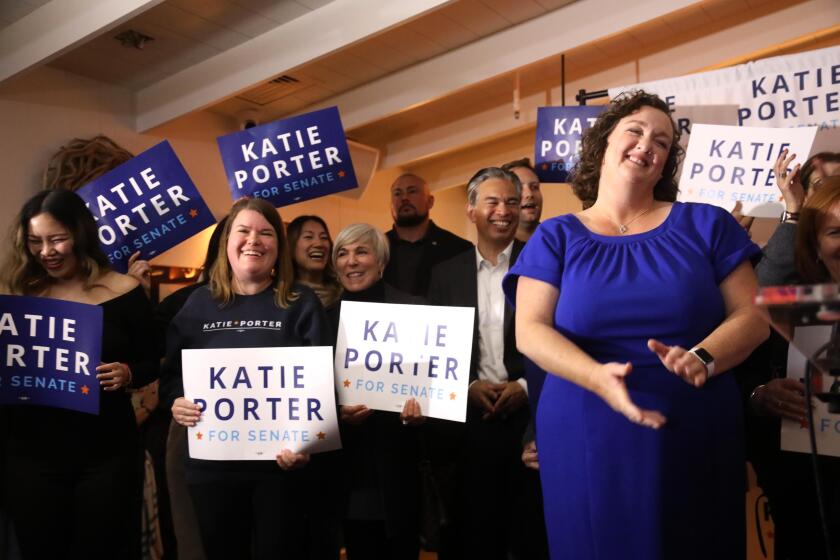Column: Northern California is losing its political dominance, and Adam Schiff’s victory proves it

For a long time, life in California had certain rhythms.
Winter snow in the Sierra. Springtime blooms in the desert. And come election season, a built-in, often insurmountable edge for Bay Area candidates seeking statewide office.
The drifts have piled up, from Tahoe to the Tehachapis. Months of rainfall promise a stunning floral display across the Southland. But that Northern California advantage? It vanished in the U.S. Senate contest on March 5.
Rep. Adam B. Schiff, whose Southern California district lies more than 300 miles away, easily carried the Bay Area on his way to a primary victory over fellow Democrats Katie Porter and the region’s own Barbara Lee. He is quite likely to win the Senate seat in November against the opponent he helped push to a November runoff, sacrificial Republican Steve Garvey.
“It’s a paradigm shift,” Garry South, a longtime Democratic strategist, said of Schiff’s nine-county Bay Area sweep.
Geography — where a candidate calls home — used to be a major factor in political success in California. Now it’s largely an afterthought, and that change could scramble campaign calculations forever.
Some were convinced Lee, who has represented Oakland in Sacramento and Washington for more than three decades, would have an upper hand in the bitterly contested Senate race. She was the only major Northern California Democrat facing Schiff and Porter, who hails from Orange County.
But Lee managed no better than a third-place finish anywhere in the Bay Area, save for Alameda County — her political base — where she placed second but still lost to Schiff by double-digits.
In falsely claiming California’s primary was rigged, Katie Porter is emulating Donald Trump and recklessly undermining faith in our embattled elections system.
That’s because any regional advantage has apparently been wiped away by the nationalization of politics, by the everywhere reach of social media and, especially, the star-making capacity of TV news, which has turned personalities like Schiff into political celebrities far beyond their native turf.
(Schiff also got a big boost from the childish taunts of Donald Trump and a censure by the Republican-run House, which not only raised his profile but turned Schiff into a hero to many Democrats.)
Historically, candidates from the Bay Area enjoyed an advantage in statewide races because people there tended to be more politically active and more attuned to their elected officials. Residents also turned out in greater numbers than voters elsewhere in California, offering a lift to those candidates they were most familiar with.
“You hardly ever hear a conversation about politics standing in line at a Starbucks in Southern California,” said Ace Smith, who has run campaigns in the Bay Area and statewide for more than four decades. “But you hear those conversations in Northern California.”
That may be a generalization, but history bears out the gist of what Smith suggested. The Bay Area’s long-standing, outsize influence in state politics has boosted the careers of, among others, Kamala Harris, Gavin Newsom and Dianne Feinstein, all of whom prevailed over rivals from California’s more populous southern half.
It’s been particularly tough going for House members running statewide. In over a century, just a handful managed to make the leap to the Senate.
That’s because most of them spent their careers toiling in relative anonymity. Venture just a few blocks outside one of California’s congressional districts — there are 52 of them, spread over 1,000 miles from north to south — and a visiting lawmaker could just as well have been a member of the witness protection program.
Raising money, building name recognition, scaring up a decent-sized crowd were all stiff challenges for any representative who ventured too far from home.
But things changed dramatically in recent years. A viral moment or headline-making turn on the Washington chat show circuit — where Schiff seems to enjoy semi-permanent residence — can now transform the most obscure member of Congress into a household name.
By choosing Schiff, voters rejected the leftward swerve promised by more liberal alternatives. By advancing Garvey, they set up a conventional partisan runoff.
In fact, it might be said the path to statewide political success no longer runs through the hillsides of San Francisco, the flats of Oakland or the sprawl of Silicon Valley.
As Porter — of whiteboard fame — and Schiff demonstrated, reputations can be made and careers may be more fruitfully built in the TV studios of Washington, on the House floor or inside the committee rooms where inquisitions are broadcast from Capitol Hill.
Bob Shrum, a veteran Democratic strategist, once said a political rally in California consists of three people gathered around a television set. He was referring to the power of advertising, the only effective way to reach voters in a nation-state with tens of millions of voters.
A slight update may be needed, to account for technological changes. A television set, one could say, or the smartphone voters cradle in the palm of their hand.
But Shrum’s general observation, on the political power of the small screen, is truer than ever.
More to Read
Get the latest from Mark Z. Barabak
Focusing on politics out West, from the Golden Gate to the U.S. Capitol.
You may occasionally receive promotional content from the Los Angeles Times.













